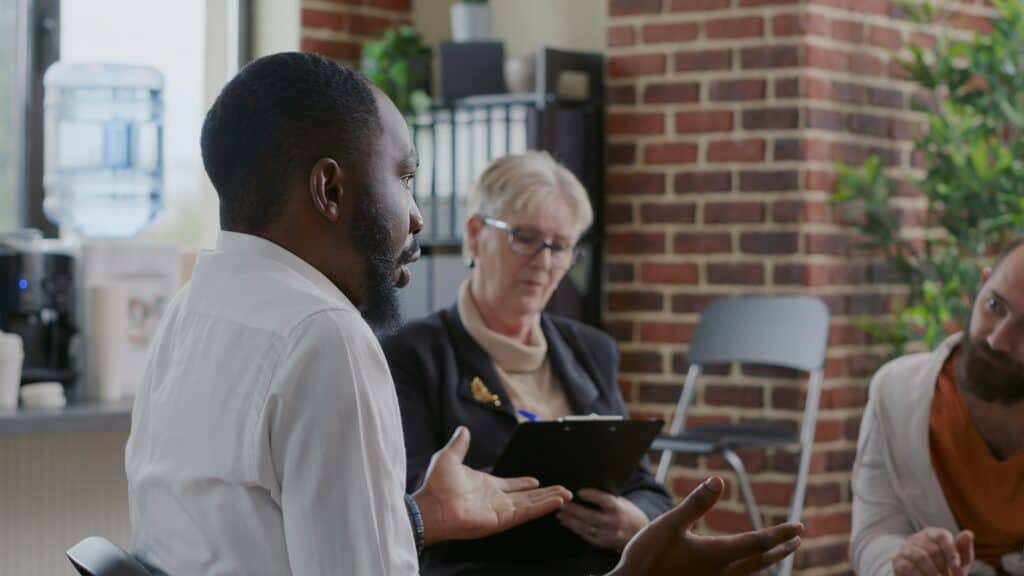Whether it’s you or a loved one that’s seeking the path to true recovery from substances, you’ve likely come across these terms: inpatient and outpatient treatment. But what exactly do they mean? What sets them apart from one another? And how does Positive Recovery add a special touch to these journeys?
That’s what we’re going to discuss in today’s blog, because the road to recovery should be transparent and easy to understand for all involved.
Inpatient Treatment: A New Beginning
Where do we begin this conversation? Well, let’s start at the literal beginning – because the “beginning” is the essence of inpatient treatment, according to Rebecca Buzek, LPC-S, Garden Oaks, Executive Director, Positive Recovery Centers.
“While treatment is not recovery and successful completion of inpatient treatment is in no way indicative of whether a person will remain sober, it is the vital first step to treating the acute symptoms of active addiction. Without this step, a person with substance use disorder is often unable to stop using long enough to begin the journey of recovery,”
Rebecca Buzek, LPC-S, Garden Oaks, Executive Director, Positive Recovery Centers
Buzek continues on to say that inpatient is more than just a first step, it’s a place where clients begin to heal.
At Positive Recovery Centers, clients are given a Values In Action (VIA) Assessment and are then evaluated medically, psychiatrically, and are given opportunities to socialize and get to know others at the treatment center. We build our client’s treatment plans using their signature strengths because, so often in addiction we forget what our strengths are.
Ups and Downs

So, what makes inpatient rehab a great place for recovering and healing in early addiction?
There are many things, but one key feature especially stands out: 24/7 monitoring.
According to Dr Jason Z. Powers, Chief Medical Officer, Positive Recovery Centers, “Rehabilitation can be a challenging process, and patients may experience emotional and physical ups and downs. Having access to support at all hours of the day helps individuals cope with these challenges and ensures that they do not feel isolated or alone in their recovery journey.”
Additionally, with family involvement, the support is provided not only to the client, but to their family or friends.
MAT
For those qualifying for Medication-Assisted Treatment, or MAT medications, including Suboxone, inpatient rehab is when and where clients will first be introduced to this life saving medication.
“For individuals with complex medical conditions or those undergoing Medication-Assisted Treatment (MAT) for substance abuse, proper medication management is crucial to ensure the effectiveness and safety of the treatment,” says Dr Powers.
Path to Healing
Inpatient treatment is a catalyst for both recovery and healing – and that’s really good news because without true healing, recovery can be nothing short of elusive. This idea is reinforced by real success stories from across the United States.
A recent edition of the NPR show, All Things Considered, titled “Addiction Is Deadlier Than Ever, But New Research Shows Most Americans Can Heal” explained that although addiction can be very harmful – and deadly – most Americans who face it can eventually get better – three out of four people, in fact!
In other words, a vast majority of people who experience addiction will eventually leave it behind.
The key is to give individuals in recovery essential coping skills, self-esteem, mindfulness, and more, to fortify their journey away from addiction. Without these tools, the cycle of relapse persists.
The NPR show underscored that structured treatment settings, providing individuals with time, care, and healing, enhance the chances of overcoming addiction and maintaining sobriety.
Therefore, both inpatient and outpatient treatments should focus on delivering tangible healing to clients and their families, in an effort to break the cycle effectively – and that’s exactly what Positive Recovery Centers does.
Outpatient Treatment: Flexibility

If inpatient is the first step, then think of outpatient as a second step or second phase for most clients.
Outpatient rehab shares similarities with inpatient treatment. They both offer therapy, counseling and addiction treatment.
The distinction lies in the fact that clients receive outpatient treatment while still residing at home or in sober living. This makes outpatient treatment a very flexible treatment option. It permits clients to uphold their everyday commitments and relationships while actively pursuing their path to recovery.
What’s Right for Me?
How can you determine whether inpatient or outpatient treatment is the right fit for you? Positive Recovery Centers addresses this question with a targeted intake process.
Ellen Plaze, Executive Director, Positive Recovery Centers, highlights the specific inquiries relevant to inpatient care: the duration of substance use, the potential detoxification risks, and the resultant consequences of usage over time.
On the other hand, when considering outpatient options, different factors are taken into account, like the presence of familial and community support, the ability to abstain from substances intermittently, and the client’s historical patterns of substance use.
But, the reality is, at Positive Recovery Centers, every case and client is unique. What determines a person to go into inpatient or outpatient varies because placement is a diverse and personalized process.
According to Julie DeNofa, President, Positive Recovery Centers, “Positive Recovery Centers takes into consideration what will create the most successful outcome for the client, by matching the intensity of services provided to what each client needs.”
Inpatient & Outpatient Positive Recovery: No More Negative Talk
Positive Recovery is grounded in the principles of Positive Psychology and offers a fresh perspective on addiction treatment that focuses on the inherent strengths unique to each individual. This approach empowers clients to grow and heal as they recover from substances.
According to Buzek, Positive Recovery is integral to the success of inpatient therapy because of the way it sparks inner acceptance and growth.
She says, “Positive recovery focuses on strengths that are inherent in every individual. People in active addiction are often pummeled with all the things that are wrong, whether that’s from friends, family, employers, or even their own self-talk. We work diligently to stop that negative self-talk loop when clients enter our program.”
Positive Introduction

From the very beginning of their inpatient journey, clients at Positive Recovery Centers are given empathy and compassion. They are taught positive coping strategies and are directed to reframe their life stories, turning what they might have seen as sad or tragic into sources of inspiration and growth.
This initial approach sets a positive tone for inpatient treatment and lays a solid foundation for the client’s overall recovery journey. While there are more steps to recovery, like outpatient and sober living, proper inpatient treatment paves the way for clients to have a successful path towards lasting recovery.
Buzek says, “One of our client’s first assignments is the positive introduction. It allows them to start the retelling of their story with something inspiring. It also puts them back in touch with the person they want to be, the person they can be.”
At PRC we remove the identification of the person and the substance, think – “ Hi, I am Joe, an alcoholic” and instead focus on “ Hi, I am Joe, me at my best is…” We do not negate the fact that our clients have a substance use disorder, we instead put emphasis on who they are as a person!
Flourish with Positive Recovery
According to Charles Fry, LCDC, Executive Director, Positive Recovery Centers, Positive Recovery is focused on how an individual can flourish in life.
“When an individual comes into treatment they are beaten down either by the substance or by themselves and instead of piling on we look at their strengths. We help them navigate through all the negative self-defeating thinking, we assist them in finding what they enjoy, and we help them find purpose, meaning, and strength,” he says.
Fry goes on to say that by nature, we as humans get down on ourselves. This natural reckoning is exacerbated by addiction. When someone comes into Positive Recovery Centers they’re taught to leave that negative thinking in the dust.
He says, “One of the biggest struggles for an individual getting into recovery is to not focus on what they are losing, but instead focus on what they are gaining and at Positive Recovery Centers we focus on the gain, not the loss.”
Beyond Inpatient, Beyond Outpatient
In conclusion, the Positive Recovery approach extends into outpatient and beyond, encompassing every step along the way to ensure personal growth and lasting healing.
During outpatient, clients continue to lean on their strengths and begin to use them innately as part of their coping mechanisms. The client’s coping skills have sharpened over time and they now are beginning to see the unique perspective they offer to the world, their community, and themselves.
According to Plaze, the best part of this approach to recovery is the happiness it brings to everyone involved.
“Positive Recovery enables us to experience the joy of helping others flourish in recovery,” she says.
Addiction Treatment Services
If you or a loved one are in need of addiction treatment, look no further than Positive Recovery Centers. PRC is committed to providing comprehensive care that addresses your addiction and mental health needs. Across Texas, several conveniently located treatment centers offer various services, from Medical Detox to Long Term treatment. Please visit positiverecovery.com or call us at (877) 697-1383 to speak with a team member today! Together, let’s break the cycle of addiction and create a future filled with hope, healing, and resilience. You are not alone in your journey.